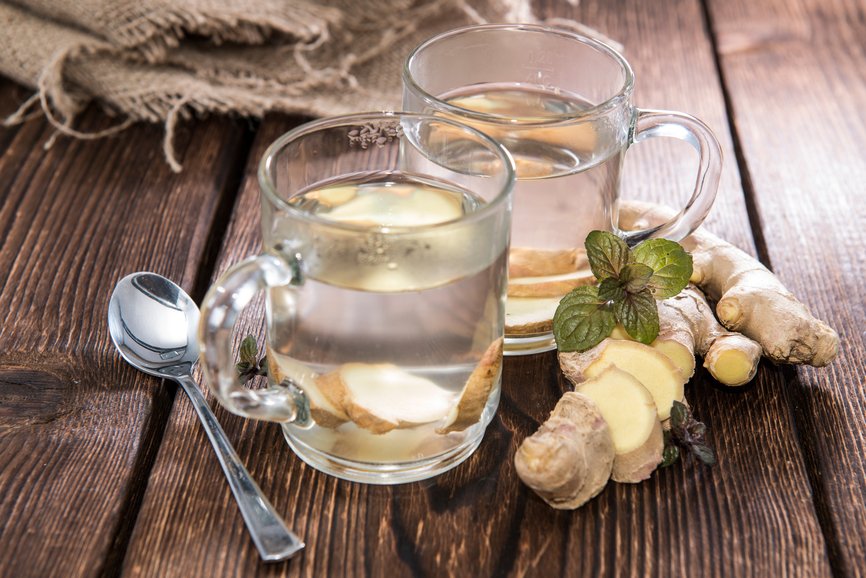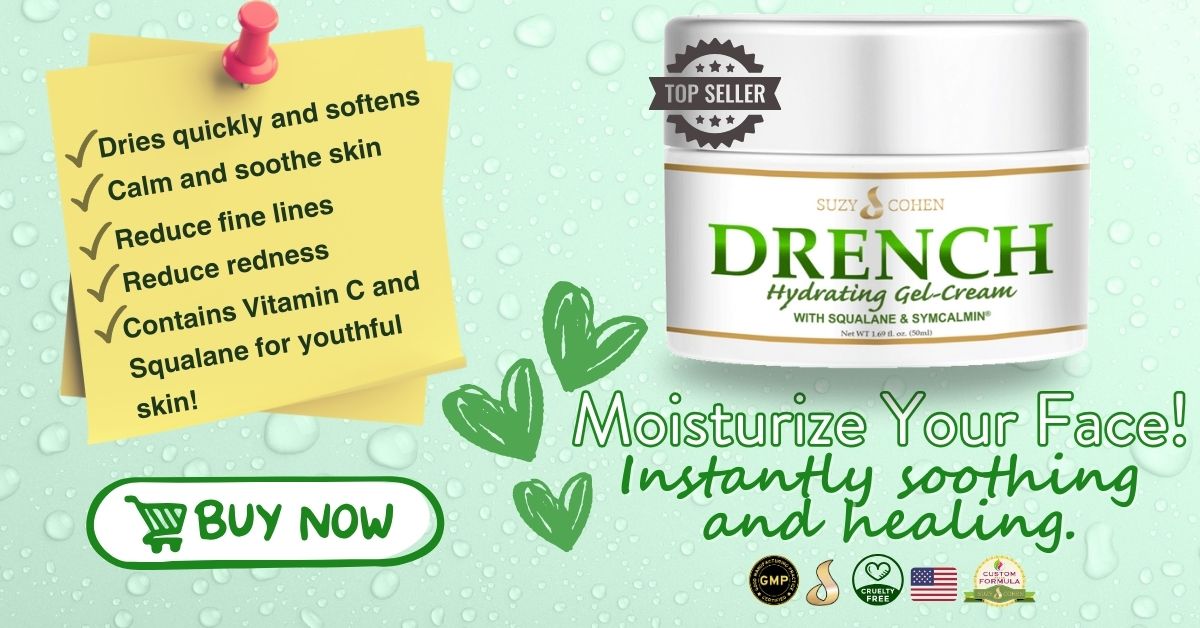What's On This Page?
ToggleToday’s article is about natural antihistamine foods. I was recently inspired to write about this topic because I was visiting Florida recently and was taken aback by how many people were blowing their noses and it was due to allergies! Way more than you might expect. So many people in all states suffer from allergies year-round, but it may be especially hard in hot, humid conditions where mold spores, weeds, flowers, and grasses are abundant!
It’s good to know ways to help your body produce its own antihistamine and how to mitigate all the sneezing, itching, and runny nose problems. When histamine and other cytokines get out of control, you can experience anaphylaxis which is a life-threatening reaction. Histamine is an ‘exciting’ chemical, it excites and wakes up the brain. This is why antihistamines often cause sedation. IgE is an antibody produced by the immune system in response to allergens. During an allergic reaction, IgE binds to mast cells and basophils, causing them to release histamine and other inflammatory mediators. This results in a wide range of symptoms, including itching, swelling, and inflammation.
Managing allergies can be a struggle sometimes, especially when the symptoms cannot be controlled rapidly. This may occur due to allergens in one’s home. Floridians all have air conditioning units, and the filters need to be changed frequently. Also, mattresses and bedding may become humid and moldy over time, which can also trigger a full-body reaction that goes on for years. Update your bedding as needed. Down comforters made with feathers are often a trigger. The hypoallergenic synthetic kind is probably better for people with allergies or just plain organic cotton blankets. It’s such a personal decision and you have to experiment.

Your immune system must be in tip-top shape in order for you to beat this, and your immune function relies on proper rest, food, water, and vitamins, not to mention probiotics. This is why antihistamines don’t cure a person completely sometimes and the allergies become intermittent throughout one’s life. About 50 million Americans are affected by allergic rhinitis.
People who suffer from allergies are often told to avoid triggers, but that is nearly impossible sometimes and I understand that. How about eating your way to better health? Here are some good ideas to help you improve your diet so it will include more antihistamine foods.
5 Antihistamine Foods to Eat
1. Capers.
These delicious treats are something I like to put on top of a bagel with some Puck® and nova, as well as everything seasoning spice. The capers are rich in quercetin. Quercetin and its cousin compound called DHQ (dihydroquercetin) are one of the strongest natural antihistamines known to man. Quercetin-rich fruits like apples and most vegetables will help attenuate allergic reactivity in almost every one! Supplements are available too if the capers aren’t enough! But how does it work as an antihistamine food???
It’s because it reduces histamine. Capers contain a flavonoid called quercetin, which has been found to inhibit the release of histamine from immune cells such as mast cells. Quercetin works by stabilizing mast cells, which can help to reduce the release of histamine in response to allergens. While more research is needed to fully understand the benefits of capers in reducing histamine levels, incorporating them into a balanced diet may be a helpful strategy for individuals seeking natural antihistamine options. It is important to note that capers are a high-sodium food and should be consumed in moderation, particularly for individuals with high blood pressure.
Pineapples.
Bromelain is the enzyme that fresh pineapple confers and it’s a strong anti-inflammatory enzyme. It can help with a runny nose and itchy, swollen eyes. It will help with mucus production and allergies by blocking chemicals that cause misery. Bromelain is a popular natural post-surgical supplement because it speeds up the healing of tissue. But mostly, it helps with airway problems in people with allergies and asthma. If you’re interested in learning more about asthma medications, I’ve written an article about it, just CLICK HERE.
Eat pineapple if you can! Just a note of caution because some people are actually allergic to pineapple. If you are one of those people, then you may also have cross-reactivity to bananas so be careful.

Ginger is a natural antihistamine
Ginger has been found to have antihistamine properties, which can be helpful for individuals with allergies or asthma. Histamine is a chemical produced by the immune system in response to allergens, and can cause symptoms such as itching, sneezing, and inflammation. Ginger works by inhibiting the production and release of histamine in the body, helping to reduce these symptoms. Additionally, ginger has anti-inflammatory properties, which can help to further reduce inflammation in the airways and improve breathing. While ginger is a natural antihistamine, it is important to talk to a healthcare provider before using it as a treatment for allergies or asthma, as it may interact with certain medications or have side effects in some individuals.
I like those Ginger Chews® and also crystallized ginger, as well as the type in sushi cuisine. My favorite form of ginger is ginger tea which is easy to make. Ginger is a natural antihistamine and it’s strong. It helps immediately with a scratchy, raw throat which may occur if you have a lot of phlegm dripping down. Ginger is also thought to help with DNA damage, that’s why some oncologists recommend it. Again, this is a very strong herbal remedy when it comes to controlling cytokines of all sorts, including histamine. The documented effect comes from valuable ingredients shogaol, gingerols, and paradols. Here’s a recipe to make a Peach Ginger Smoothie.
And if you’d like more information on ginger, CLICK HERE to read my other article entitled, Why You Should Eat More Ginger.
But the point is, antihistamine foods that contain ginger can help you feel better, and reduce inflammation (by controlling cytokines).
Ginger is known to help with asthma and allergies. The gingerols and shogaols, have been found to inhibit the production and release of histamine, which is a mediator of the allergic response. Technically speaking it’s these compounds that are the “antihistamine foods” not the ginger itself, but because ginger contains these compounds, I’m counting it!
Histamine can cause itching, swelling, and inflammation. Ginger has also been found to inhibit the production of inflammatory cytokines and to downregulate the expression of COX-2. Studies have investigated the use of ginger as a treatment for asthma and allergies, with positive results. Ginger extract has been found to reduce symptoms such as wheezing, coughing, and shortness of breath in individuals with asthma, and to inhibit the release of histamine from mast cells in vitro. While ginger is generally safe, it may interact with certain medications and cause gastrointestinal upset in some individuals. Further research is needed to fully understand the benefits of ginger in the treatment of asthma and allergies.
Navel Oranges are antihistamine foods
Navel oranges have been found to contain compounds that may help to reduce histamine in the body. Histamine is a chemical produced by the immune system in response to allergens and can cause symptoms such as itching, sneezing, and inflammation. Navel oranges contain a flavonoid called hesperidin, which has been found to inhibit the production and release of histamine in the body. Hesperidin works by blocking the activity of an enzyme called histidine decarboxylase, which is involved in the synthesis of histamine. Additionally, navel oranges are rich in vitamin C, which has been found to have anti-inflammatory properties and may also help to reduce histamine levels.
While more research is needed to fully understand the benefits of navel oranges in reducing histamine levels, incorporating them into a balanced diet may be a helpful strategy for individuals with allergies or asthma.
Vitamin C is a powerful water-soluble antioxidant with many well-documented antihistamine effects. It helps prevent your body from making so much histamine while improving collagen production and immune function. Eating grapefruit, or oranges each day could provide enough C for a mild allergy. Navel oranges are higher in C than blood oranges, generally speaking. If you need supplementation, those are widely available at health food stores. Natural sources are gentle on the STOMACH.
If you’re interested in a Vitamin C Supplement, check out mine because it is easy on the tummy. CLICK HERE to see it on Amazon. It is 100% natural, and includes the biologically active form of quercetin!
Watercress is an antihistamine food.
This is a vegetable found in the produce department and it’s one of my favorites! It is an outstanding natural antihistamine and you just cut it up and put it into your salad, here’s my RECIPE for Watercress Hearts of Palm Salad.
Watercress is useful because it will support your body’s detoxification via the tremendous amount of chlorophyll present in the leaves. It’s a lot of bang for the buck because you’re getting quercetin in it, lots of B vitamins, chlorophyll, fiber, and other antihistaminic compounds. Here’s another ARTICLE I wrote about watercress’s health benefits.
Just a quick hack for your red, itchy eyes. Buy a saline water eye kit at the pharmacy or online. Keep it in the house in case something like a household detergent or cleanser accidentally spritzes you in the face and you want to rinse your eyes. If your eyes are irritated and itchy, you can rinse some and soothe them within seconds. These help with red, puffy, itchy eyes that are swollen. You just lean over the sink and tilt your head back with the eyecup and saline rinse. Don’t add anything to the saline water, use the solution that comes with your eyecup.
Before closing, I want to point you to one of my articles on itching and eczema where I mention mast cell activation syndrome or MCAS. The difficulty for some is that histamine is hard to test for directly, so a proper diagnosis evades you. CLICK HERE to read it.
For more information about allergies you can read these articles:
10 Natural Solutions for Allergies and Sinusitus
Novel Treatments for Chronic Itch, Eczema and Skin Infections
10 Quick Ways to Relieve Itchy Red Eyes

Suzy Cohen, has been a licensed pharmacist for over 30 years and believes the best approach to chronic illness is a combination of natural medicine and conventional. She founded her own dietary supplement company specializing in custom-formulas, some of which have patents. With a special focus on functional medicine, thyroid health and drug nutrient depletion, Suzy is the author of several related books including Thyroid Healthy, Drug Muggers, Diabetes Without Drugs, and a nationally syndicated column.



